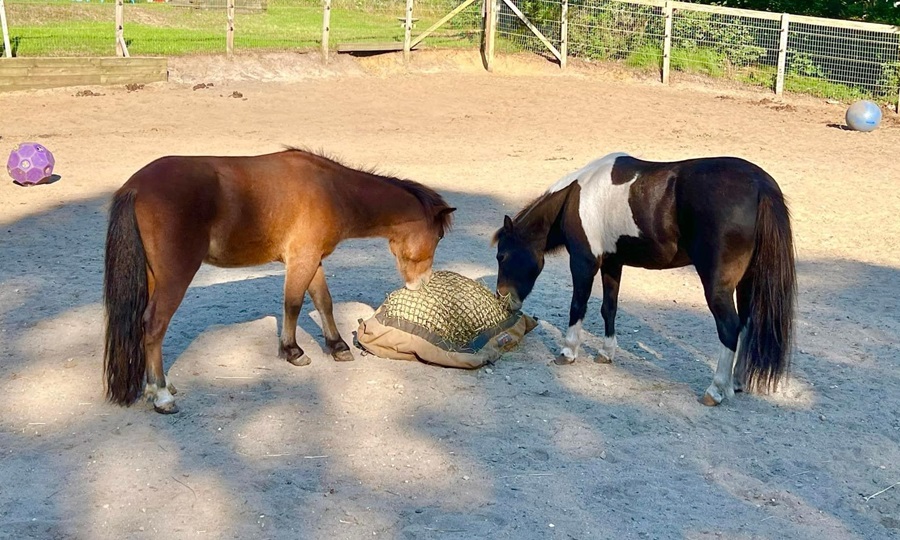When I was a teenager at Provincetown High School in the 1970s, I knew many girls who hung around the horse stables so they could ride horses. Back then, we had several working barns in town. There were the stables where the Galeforce dairy had been in the West End and Nelson’s on Nelson Avenue — those two were the largest.
On a search for horsewomen on the Outer Cape today, I reconnected with one, Lauriana Willis, who had been a “barn rat” at Nelson’s, grooming horses and cleaning stalls for the love and privilege of riding. She’s in Wellfleet now, as is Allison Gray, who grew up in Orleans with the same kind of all-out interest in horses.

Willis started working with horses when she was 10. At Nelson’s, which she thought of as her “home barn,” a horse named Ramie was hers to ride. Later, she rode Felix, the first horse she ever owned, in Provincetown’s Fourth of July parade. Thirty years ago, she moved to Wellfleet where she now keeps one horse of her own, Prairie. And she still works with other people’s horses.
Prairie is 21 and became Willis’s as a nine-year-old rescue. The horse had been incorrectly shoed by an incompetent farrier and rendered lame. After about six months in Willis’s care, Prairie was able to walk again.
Willis tells me that although horses are considered herd animals some thrive alone. Reata, an Appaloosa she once had, “would have a nervous breakdown” when left alone. But Prairie is fine being the lone horse among Willis’s many goats.

Gray is the horsewoman at Anchor Watch Farm on Old Kings Highway, where she lives with her husband, James. She lives and breathes horses: we talked between one of her twice-weekly lessons in Harwich Port and an afternoon of cleaning the paddocks.
Gray lived for years in Oregon where, she admits, it was easier and less expensive to own horses than it is on Cape Cod. She started riding when she was five and got her first horse at 14. In the same way Willis did, Gray took care of the horses at a barn in Brewster where she helped with ponies in exchange for riding. At 16, she says, she was so into horses “I didn’t even care about getting my driver’s license.”
Gray left the Cape hoping to become a veterinarian, with a first stop for an associate’s degree in equine science from UMass Amherst’s Stockbridge School of Agriculture. From there she went to Oregon, where she rode a horse to work at a veterinary clinic. She took a detour, however, to learn about tending to humans and ended up becoming a paramedic. Gray returned to the Cape in 2011 and went to work soon after that as a firefighter-paramedic with the Wellfleet Fire Dept.
Cost is the biggest obstacle to horse ownership here, the horsewomen agree. Buying a horse at $4,000 to $5,000 is “just the beginning,” Gray says. There is the question of land. One acre is the minimum required to keep horses in Wellfleet, though smaller lots are sometimes allowed by special permit.

The alternative to keeping a horse yourself is to board the horse at someone else’s barn. “Rough boarding,” where the owner cares for the horse entirely, runs about $500 a year. When the barn owner does the work and feeds the animals, the cost is more like $1,000 per month.
The town also requires a permit for each horse. There are three living at Anchor Watch Farm: two of them are retired thoroughbred racehorses, Oakley and Leo, and one is an Arabian mare, Shawnee.
Gray’s horses go through about 100 bales of hay per month, with the cost of hay at about $12 per bale, she says. The thoroughbreds, whom Gray calls “my boys,” are geldings. They are playful and high energy, and so their diet includes shredded beet pulp for the extra calories they need.
The Anchor Watch tack room is stocked with the horse’s blankets of different weights, brushes and shedding blades, hay bags and toys — they love balls stuffed with peanut butter — alongside saddles and other riding equipment.
The farrier Gray relies on comes from off-Cape every six weeks for the thoroughbreds; they need to be shod — a job that also includes hoof care — more frequently than the mare does. Any horse that is ridden a lot, especially on pavement, needs shoes; they run about $150 per shoe.
Both of these horsewomen know the beaches and trails of the Outer Cape by heart. They enjoy them most in the off-season. At this time of year, they begin to brace for the onslaught of traffic that makes crossing and riding along roads difficult. The biggest hazard, they say, is unleashed and out-of-control dogs that chase and even bite the horses.
Willis reminisces about the old days, riding at 5 a.m. before her family was awake through Fox Island Marsh and around Blackfish Creek. Life is less hectic now. She often rides bareback out of laziness, she says.
One thing is clear: the devotion to horses that takes hold of a barn rat is not something that ever goes away. Decades after trading chores for riding time, Gray puts it this way: no matter the time, work, and cost involved, “I could never not have horses.”



